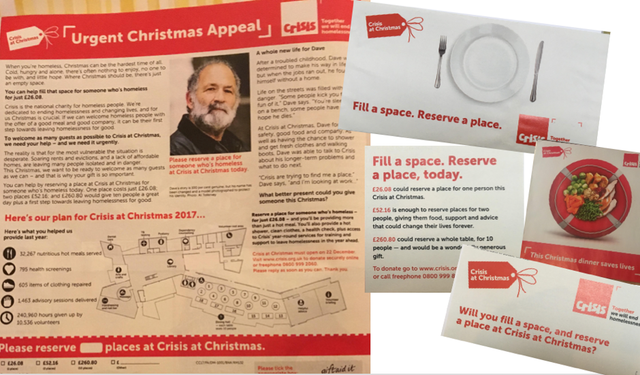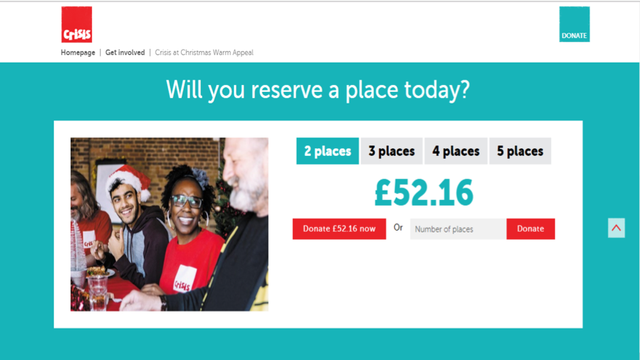Crisis at Christmas
- Exhibited by
- Michael Dent, Director of Fundraising Alzheimer’s Society
- Added
- January 24, 2018
- Medium of Communication
- Individual Giving
- Target Audience
- Type of Charity
- Country of Origin
- UK
- Date of first appearance
- 1971
SOFII’s view
We love to celebrate campaigns that make the process of donating simpler and clearer at SOFII, and that is the key strength of ‘Reserve a Place’. The set and specific amounts offered for donors to contribute are accompanied by detailed information that clearly indicates what the beneficiaries will receive. With a simple message and a great pack, Crisis at Christmas have made a real impact for their beneficiaries and engaged their supporters to give more.
Summary / objectives
To raise essential funds to support Crisis direct support for homeless and destitute people over the festive Christmas period in London, Birmingham, Edinburgh and Newcastle.
Background
The first Crisis at Christmas was established in 1971 by some volunteers and run in some Whitehall Churches over the festive period. The fundraising appeal raised £7000 to fund this essential support.
From this year onwards Crisis at Christmas steadily grew year on year in terms of both people being directly helped but also volunteers involved in delivering the service. In 2001 it expanded out from its London heartland to run Crisis at Christmas in Edinburgh, Birmingham and Newcastle. The game-changing “Reserve a Place” campaign was launched in 2009.
Creator / originator
‘Reserve a Place’ was created by Catalyst Works Agency in 2009.
Special characteristics
The Reserve a Place fundraising proposition has managed to make a highly complex issue such as homeless and depravation into a simple and specific ask.
The principle is that for a specific fixed amount of money (in 2017 £26.08) - you can reserve a place for one homeless person at Crisis at Christmas. That place will mean that person has a hot meal, hot shower, clean clothes, health check, education and training opportunities all year round.
The proposition expands easily to two places for £52.16, four places for £104.32 or even a whole table (10 places) for £260.80. This gives it great flexibility and clarity and makes it attractive to individual donors at all levels as well as corporates and schools.
The campaign proposition runs across multiple different creative treatments and through a strong multi-channel approach including direct mail, inserts, press ads, door drops, TV, digital and social media.
Influence / impact
The launch of the ‘Reserve a Place’ fundraising campaign and strategic proposition has transformed Crisis at Christmas from a good annual fundraising appeal to a sector leading, innovative and transformational campaign which since its launch has raised over £65m and recruited a whopping great 500,000 new supporters.
The details:
The fundraising proposition was first tested in 2009.
Costs
The 2017 Crisis at Christmas campaign cost approximately £7 million.
Results
This year’s Crisis at Christmas campaign raised an impressive £15m and recruited almost 100,000 new supporters at break-even or better.
The warm campaign to existing supporters has raised £6.8 million and achieved an amazing 19:1 return on investment with an average gift of £65.
The cold recruitment campaign for new supporters has raised £8.2m and recruited at impressive 100,000 new supporters at an average gift of £55 and return on investment of over 1:1 (break-even on recruitment which is off the scale and sector-leading).
This enabled hundreds of volunteers to help over 4437 homeless and destitute people at the four Crisis at Christmas centres over the nine-day festive period receive essential help and support.
Merits
This campaign is a game-changer and what is transformational and pure genius is what Crisis at Christmas have done by simplifying the highly complex issue of homelessness and destitution into a bite-sized chunk with a simple fundraising proposition, ‘Reserve a Place’. This is a clear, specific and measurable ask that everyone can understand and support.
You can read more about the Crisis at Christmas appeal on The Guardian newspaper's website here.

 View original image
View original image


















